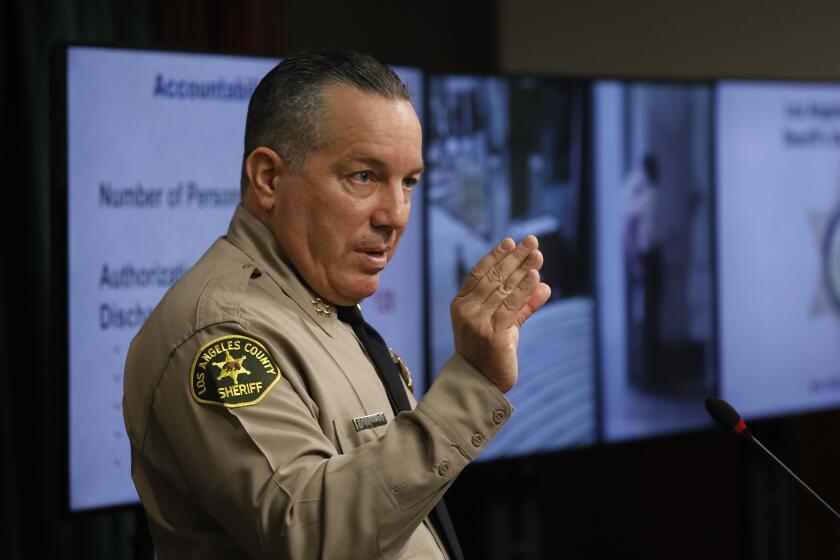L.A. County Supervisor Sheila Kuehl’s home searched by sheriff’s investigators
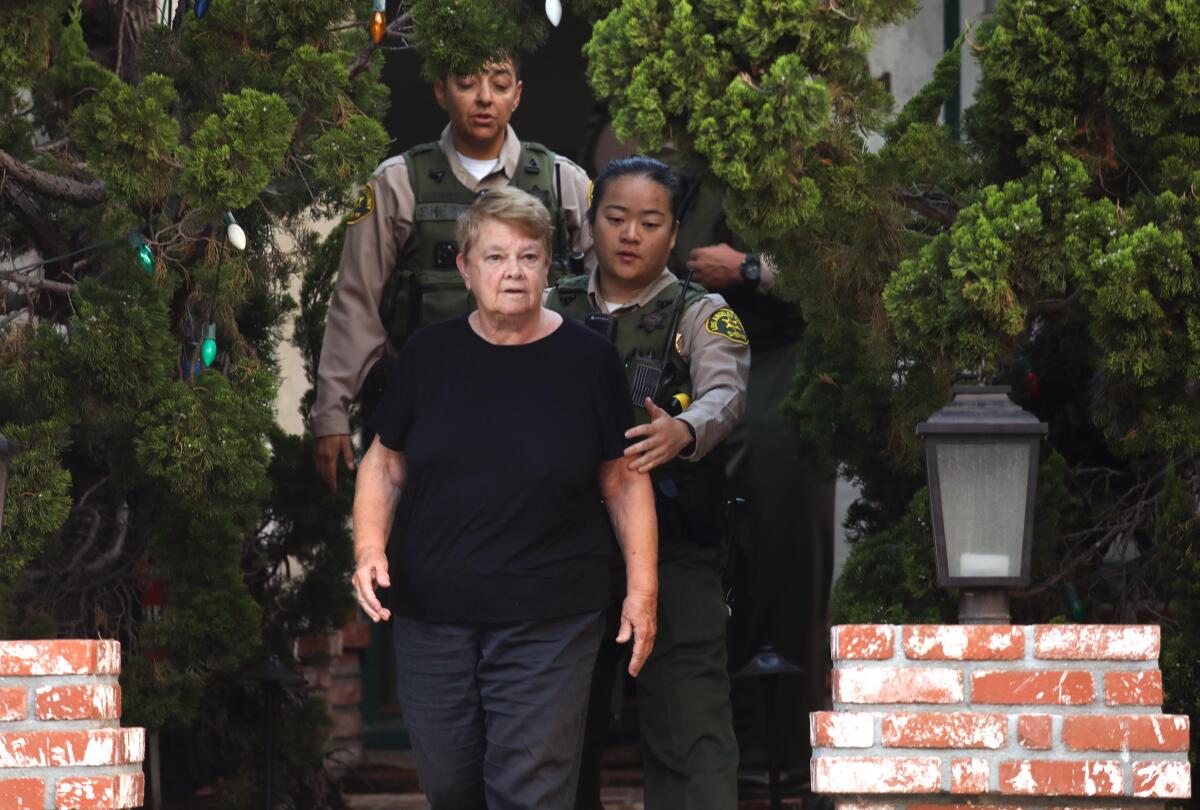
Los Angeles County sheriff’s investigators searched the house of county Supervisor Sheila Kuehl on Wednesday as part of a criminal investigation into a county contract awarded to a nonprofit organization.
A few minutes after 7 a.m., a deputy pounded on the front door of the supervisor’s Santa Monica property, with several other deputies lined up behind him.
“Sheriff’s Department. We have a warrant. We demand entry,” he shouted. Kuehl appeared shortly after and was handed some paperwork. Several deputies went inside.
A barefoot Kuehl was escorted away from the house and her phone was taken from her. Inside, sheriff’s investigators could be seen opening and closing doors. One deputy appeared to be taking photos or videos.
A copy of the warrant, signed by Superior Court Judge Craig Richman, showed that the search was tied to an ongoing probe into Peace Over Violence, a nonprofit run by Patti Giggans, a member of the Sheriff Civilian Oversight Commission and a close friend to Kuehl. Both Kuehl and Giggans have clashed fiercely with Sheriff Alex Villanueva and have called for his resignation.
Sheriff’s investigators also searched Giggans’ house, her nonprofit’s offices, offices at the L.A. County Hall of Administration and the headquarters of the county’s Metropolitan Transportation Authority, which awarded contracts to Giggans’ organization. The warrant to search Kuehl’s house authorized investigators to seize any documents or electronic files “related to the Peace Over Violence contract acquisition.”
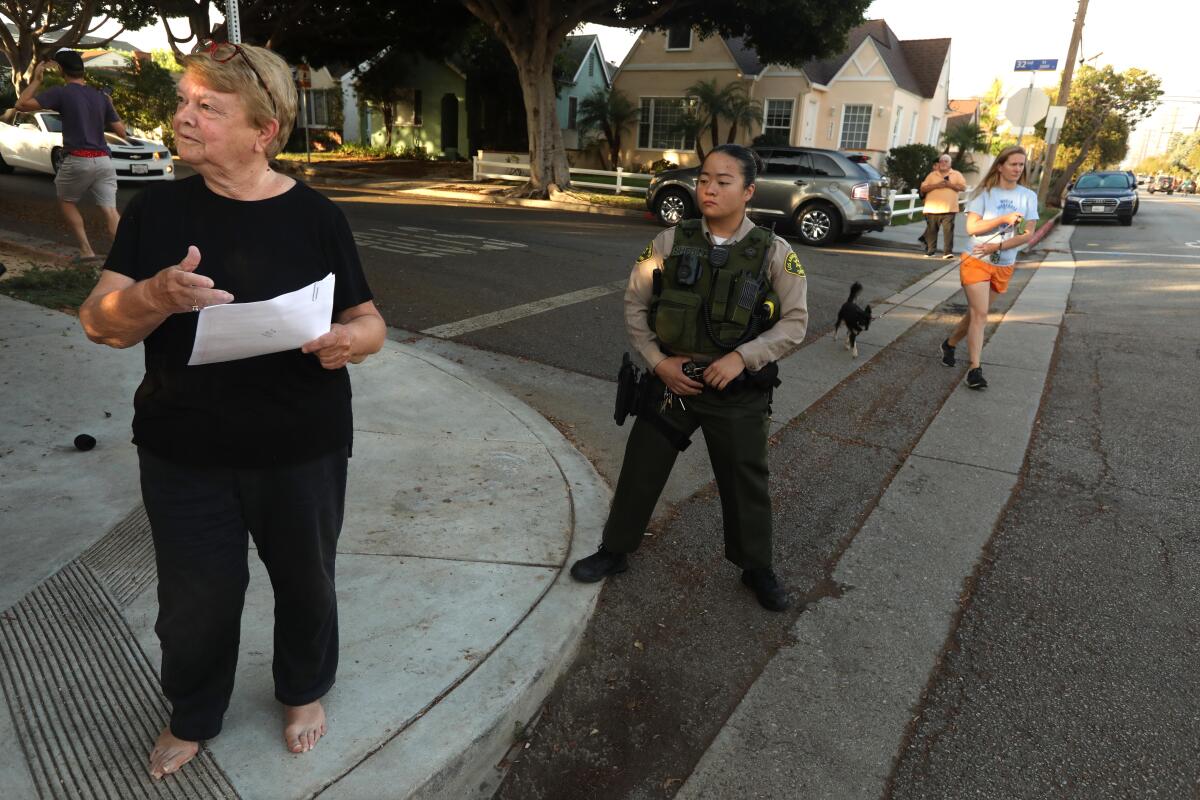
In a brief statement, the Sheriff’s Department announced the searches but declined to provide details, citing the ongoing criminal investigation. Later, in an unusual move, the department posted to its website a detailed statement about the case that investigators submitted to Richman when they sought the warrants. In it, investigators claimed an array of bribery and other crimes related to the contracts may have been committed, including “bribery of a county supervisor.”
Later on Wednesday, the county district attorney’s office said in a statement that prosecutors “were not consulted or aware of the search warrants that were served today. In this case, because we did not review the warrant beforehand, we do not intend to defend it if challenged in court.”
The district attorney’s office said that last September sheriff’s investigators presented the evidence they had gathered about the Peace Over Violence contracts and asked prosecutors to consider filing criminal charges. Prosecutors refused, finding the evidence “did not prove criminal conduct beyond a reasonable doubt.”
The Sheriff’s Department indicated it would keep investigating, and “we have not had additional contact on the matter,” the district attorney’s office said.
The warrants marked a dramatic escalation of the sheriff’s long-running investigation into the nonprofit‘s contracts and reignited angry claims from critics that Villanueva is using a secretive public corruption unit to target political enemies and others who have crossed him. Villanueva has denied the claims, saying he has recused himself from the unit’s work in order to avoid conflicts of interest.
“Alex, I am told, recused himself from this, but that means of course that he knows about it and ... all of the blame resides with him anyways,” Kuehl said of Villanueva. “If he doesn’t know about it, that means there’s a rogue element within the Sheriff’s Department. And either way, it’s totally out of control.”

L.A. County sheriff’s investigators arrived at County Supervisor Sheila Kuehl’s home early Wednesday with a search warrant.
The statement investigators presented to the judge made clear they were focused on a series of contracts worth more than $800,000 that Metro awarded to the nonprofit from 2014 to 2020 to operate a hotline for reporting sexual harassment on public transit. The statement says that the hotline was a “complete failure” but that the contract was still extended without a competitive bid or analysis.
According to the statement, a whistleblower, whose name was redacted, told sheriff’s investigators that the contract was pushed forward by Metro Chief Executive Phillip Washington “in order to remain ‘in good graces’ with” Kuehl.
It also details campaign contributions Kuehl received from Giggans and others associated with the nonprofit, alleging that “the donations can be seen as having been given for payment in return for the future awarding of the” hotline contracts.
The whistleblower has been publicly identified previously as Jennifer Loew, a former Metro employee who alleged she was targeted for retaliation by supervisors after making claims of misconduct against the agency. Court records show Loew reached a settlement in a lawsuit she filed against Metro. Her husband, Adam Loew, said Wednesday that the settlement agreement was for more than half a million dollars.
In an interview outside her house while the search was underway, Kuehl denied any wrongdoing and called the allegations “totally bogus,” saying she “didn’t know anything about the contract” and that the Board of Supervisors did not vote on whether to approve it.
“This whole thing is drummed up I think by a very disaffected ex-employee,” Kuehl said. Kuehl also said county lawyers alerted her Tuesday night to the impending search.
After her comments, Villanueva sent a letter to California Atty. Gen. Rob Bonta asking him to open a criminal inquiry into the early warning Kuehl received, as well as what Villanueva said were the “obvious” signs Giggans knew in advance as well. In the letter, Villanueva accused Max Huntsman, the sheriff’s inspector general who has clashed repeatedly with Villanueva, of being involved in tipping off Kuehl.
Huntsman denied the allegation. “But he’s right about one thing: The phone records will show whether I tipped them off or not. I didn’t,” he said.
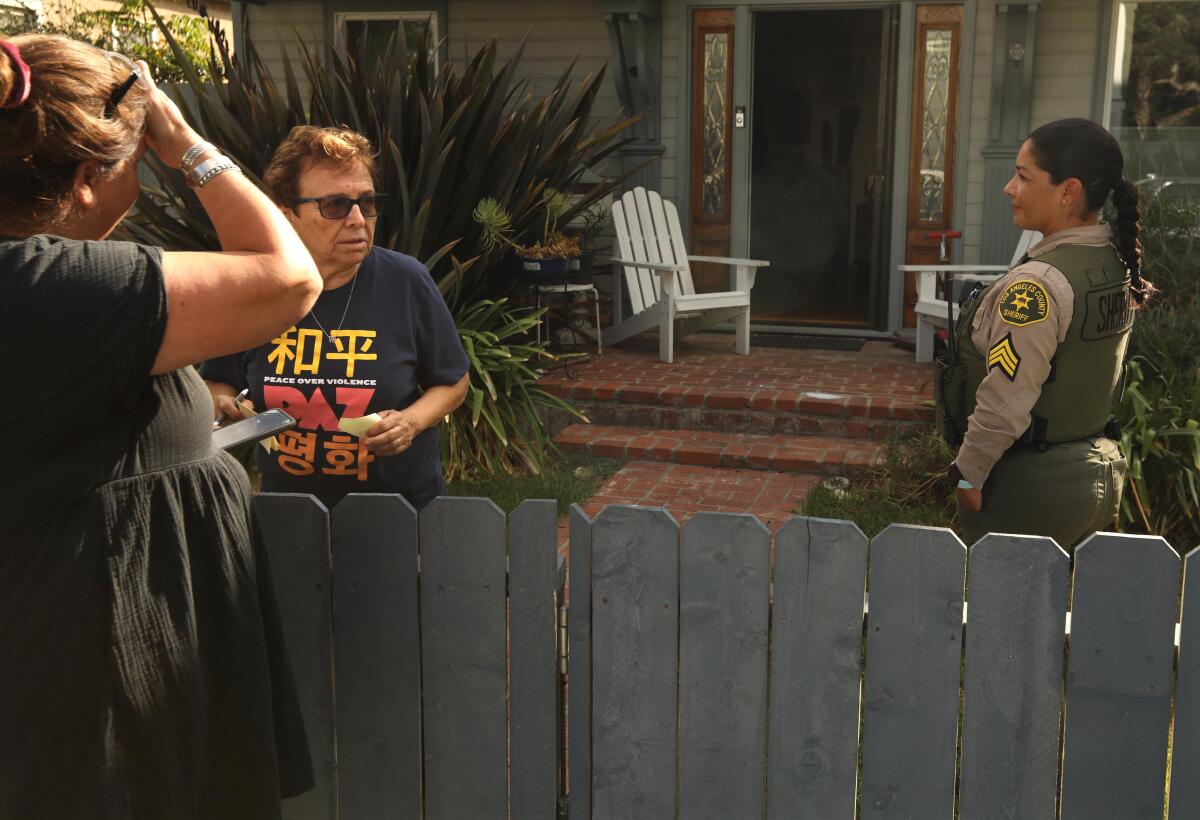
As the search of Kuehl’s house was underway, another team of deputies was in and out of Giggans’ home a few miles away, carrying away a computer and flash drives. Giggans said they had a warrant signed by the same judge, Richman, to look for technology. She also said investigators seized the nonprofit’s server during the search of its office.
“I don’t know how we’re going to be able to function,” she said. “The server is, you know, all communication.”
Her attorney, Austin Dove, said the investigation was driven by the sheriff’s contempt for oversight.
“These are Third World tactics,” Dove said. “Vladimir Putin would be impressed.”
When a tow truck prepared to take away her car, Giggans angrily objected, saying the warrant did not authorize seizing the vehicle. “This is a lawsuit in the making,” Giggans said, adding, “Bullies.”
A little-known team of investigators in the L.A. County Sheriff’s Department has pursued criminal investigations into some of Villanueva’s most vocal critics.
Critics of Villanueva have raised alarms before about the public corruption unit that carried out Wednesday’s searches. Last year, George Gascón, the county’s district attorney, decided he wanted nothing to do with the unit after sheriff’s officials proposed the two agencies create a task force to collaborate on public corruption investigations.
“He’s only targeting political enemies,” Gascón told The Times last year about Villanueva. “It was obvious that was not the kind of work I wanted to engage in, so we declined.”
Shortly after Gascón refused to partner with the Sheriff’s Department, Villanueva came out as a strong supporter of a Gascón recall campaign that ultimately failed to kick the district attorney out of office.
The slow pace of the unit’s investigations and its apparent lack of results have only deepened suspicions.
“These highly publicized criminal investigations have never resulted in charges being filed, suggesting an ulterior motive,” Sean Kennedy, a Loyola Law School professor who sits on the Sheriff Civilian Oversight Commission, said in a 10-page memo calling for an investigation into whether Villanueva is abusing his power.
Sheriff’s investigators have already served warrants related to the hotline contract allegations.
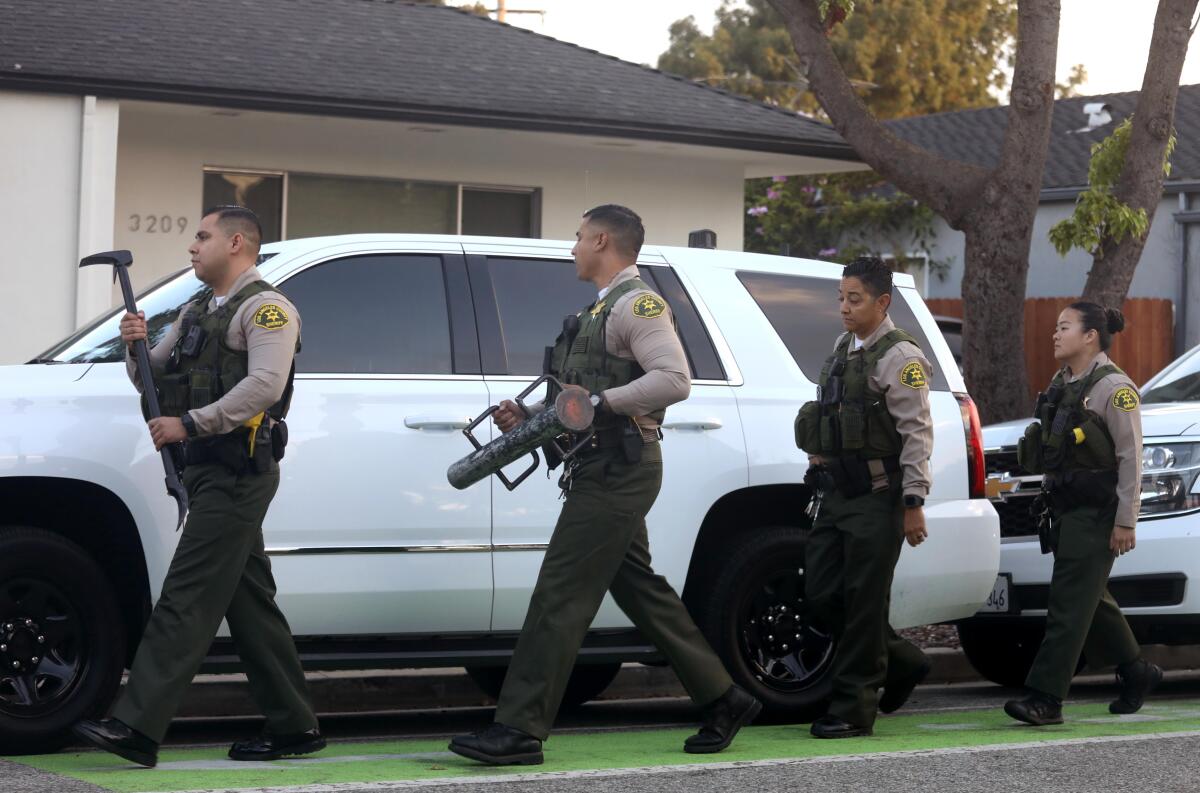
Last year, a member of the public corruption unit showed up to Peace Over Violence’s offices and introduced himself as a sex crimes investigator. The investigator, Sgt. Max Fernandez, was given a tour of the office and left his business card.
A week or so later, Fernandez showed up again with a warrant, Giggans said at the time.
Fernandez was looking for records about contracts the group has with public agencies, including one with Metro to operate the hotline. The warrant also demanded records on communications the organization’s staff had with various county officials, including Kuehl.
The Sheriff’s Department served similar warrants at the time on Metro officials and on Metro’s inspector general.
Giggans complied with the warrant served on her nonprofit. Meanwhile, attorneys for Metro and Metro’s inspector general filed papers in court asking a judge to throw out the warrants served on those agencies. For more than a year, attorneys on all sides have been in and out of court litigating the matter. A judge determined that the original warrants were too broad, and just this month, the parties were in court to narrow the scope of the warrants served last year.
Despite the court hearing two weeks ago, in the statement sheriff’s investigators provided to Richman to secure the warrants they claimed that Metro and Metro’s inspector general “have not surrendered the articles requested and remain noncompliant” to the earlier search warrant. They requested Richman sign the new warrants due to the “quickly approaching statute of limitations.”
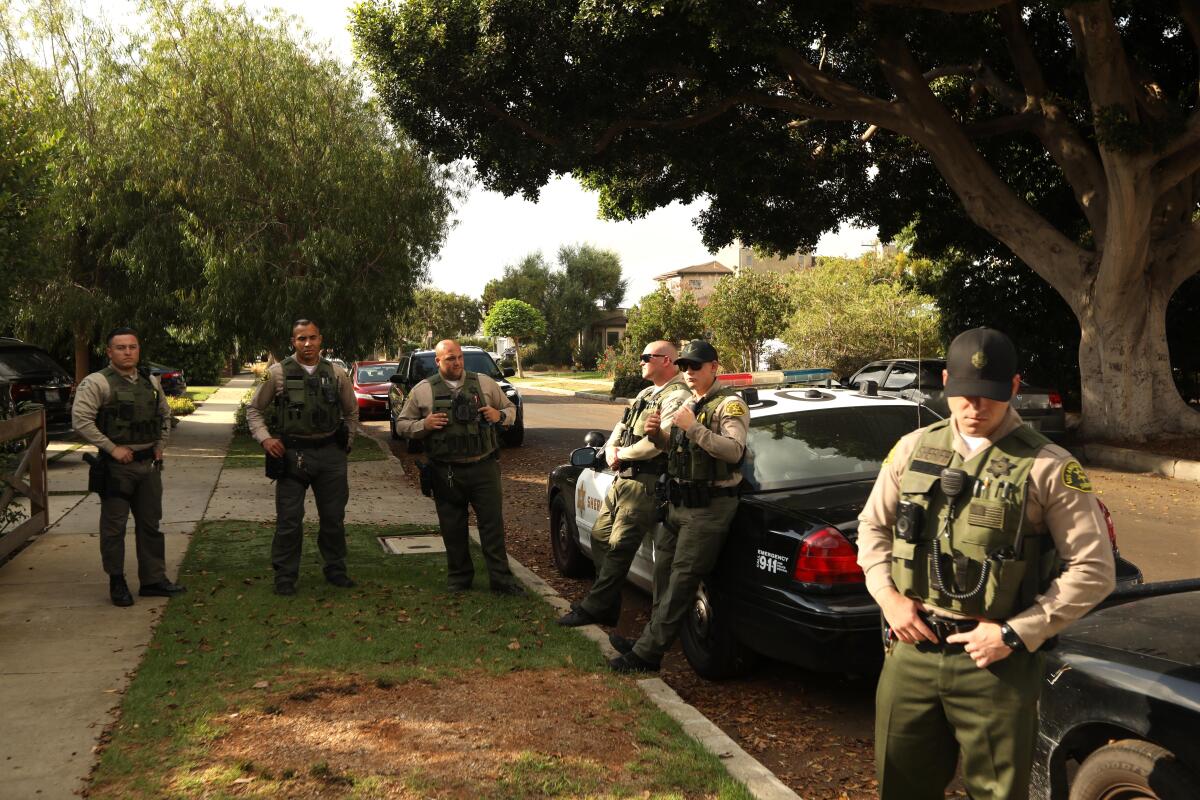
Investigators asked to search Kuehl’s and Giggans’ homes, not just their offices, because they have been working remotely due to the COVID-19 pandemic, the statement said. They requested to search Giggans’ home for computers and cellphones because many of the emails she provided as part of the first warrant said they were “sent via iPhone.”
A lead investigator of the sheriff’s public corruption unit is Mark Lillienfeld, a retired homicide investigator with a decades-long relationship with Richman, the judge who approved the warrants served Wednesday.
They have known each other since at least 1996, when Richman was a prosecutor handling an attempted murder case Lillienfeld investigated. The detective would later visit the judge’s home to get warrants signed. Lillienfeld’s wife worked in Richman’s courtroom, transcribing hearings as an official court reporter.
Their relationship came under scrutiny several years ago when there was an internal Sheriff’s Department inquiry into whether Lillienfeld tried to help Richman out of legal trouble.
More to Read
Sign up for Essential California
The most important California stories and recommendations in your inbox every morning.
You may occasionally receive promotional content from the Los Angeles Times.
